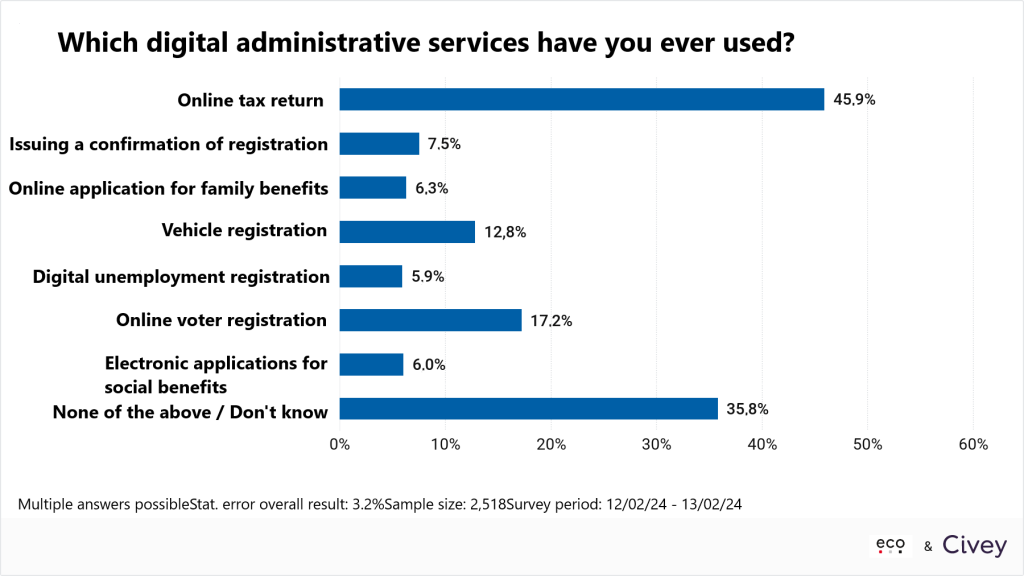eco Chair of the Board Süme: “Access to many online administrative services in Germany is still too difficult in comparison with international standards”
- Online administrative services currently only replace a few administrative procedures
- Around 46 per cent complete tax returns online
- eco Association welcomes the right to online administrative procedures in the Online Access Act 2.0
Citizens in Germany currently only use very few online administrative services. This is revealed in a recent representative survey conducted by the market and opinion research institute Civey on behalf of eco – Association of the Internet Industry. The most popular service is online tax returns, which are now used by almost one in two German people (45.9 per cent). 17.2 per cent of Germans have already used the option of registering online for postal voting in the past. 12.8 per cent have already registered a vehicle online, 5.9 per cent have registered as unemployed online and 6.3 per cent have applied for family benefits online.
Online Acccess Act 2.0 with too few liabilities for federal states and municipalities
“The access to many online administrative services in Germany is still too difficult or even impossible in comparison with international standards. As the Association of the Internet Industry, we therefore welcome the planned amendment of the Online Access Act (OZG). In some areas, the agreement reached by the coalition represents an improvement on the German federal government’s initial draft,” says eco Chair Oliver Süme. “We need the planned legal right of citizens for digital access to administrative services, so that implementation can be driven forward decisively. The deadline of 2028 also sets a timeframe within which implementation must take place. The German federal government and the federal states must now pull together to implement and define standards.”
However, eco is opposed to the fact that the legal right is only attended to apply to federal services. Many services are to be digitalized at federal state or municipal levels. There will also be other exceptions, such as for services that are not used frequently or for which digital provision is “technically and legally” impossible. In addition, there will be no financial sanctions for non-compliance.
“We need more commitment at federal state levels; they should not fall behind the German federal government when it comes to implementation,” Süme goes on to say. “The German federal government, federal states and municipalities have a role model function when it comes to digitalization and must lead the way here. However, it was a mistake to significantly reduce the funds for the implementation of the OZG in the 2024 budget.”
Right to online administrative procedures is a step in the right direction
The eco Association positively assesses that a simplified log-in is planned for better acceptance of the central federal account (Bund-ID), which is similar to online banking practices. Until now, citizens have had to identify themselves with their electronic identity card (ePerso) each time they log in. In the future, this will only be necessary on the first occasion. After that, confirmation through biometric features on the smartphone will be sufficient. This is necessary given that other user-friendly solutions, such as the Smart eID, are still pending.
eco also welcomes the fact that mailboxes at the state level are to be transferred to a new federal mailbox for communication between citizens and public authorities, as this will reduce duplicate structures and allow communication to be standardised nationwide. In addition, citizens will not have to create a new mailbox when moving to another federal state. End-to-end encryption of communication between citizens and public authorities would also be important to strengthen trust in digital administration.
The association is hoping that the vote in the European Parliament on the amended eIDAS Regulation scheduled for next Monday will provide important impetus. The eIDAS Regulation creates an important prerequisite for Europe-wide interoperable European Digital Identity Wallets. The eco Association welcomes the initiative in principle and hopes for the broadest possible use of the wallet.





